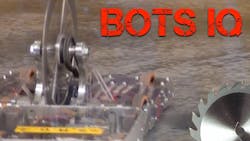Engaging Manufacturing's Next Generation Through Full Contact Innovation
Put kids in a room, let them build robots and watch how they’ll gravitate toward a job in manufacturing.
This is the philosophy behind the Kids in the BOTS IQ program. Students build robots and put their machines to the test in a competition. They are coached by mentors from manufacturing companies or academia.
The program, however, is actually a workforce development program in disguise as it shows students that careers in manufacturing are exciting while also giving companies access to future talent.
At the IndustryWeek Manufacturing & Technology Show, held in early April., a panel of workforce managers talked about this activity is providing them a pipeline of talent that has been prescreened for success.
The panelists included:
- Paul Anselmo, CEO, New Century Careers
- Katie Hager, Workforce Development Manager, DMI Companies
- Bill Padnos, Workforce Development Manager, National Tool and Machining Association
- Linda Wood, Training Program Manager, Oberg Industries
The BOTS IQ program gives students the opportunity to use their intelligence and technical skills at a time when they are undecided on what to do after high school, “says Padnos.
Attracting students to the field is tough, “How many students say that they want to go into manufacturing?” asked Padnos. “It’s not up there with firefighters and doctors.”
And because of that, Padnos says the companies in his association are not able to just post jobs and hope the talent comes to them. They have to be more active and this competition helps.
“We know from studies that 64% of high school students choose their career based on both their interests and experiences,” Padnos explained, “If they have never walked into a manufacturing facility and have never touched a machine, how are they going to think about this as a career?”
That will need to change as 40% of the manufacturing workforce will be at retirement age by 2020.
Also needing a change is the perception of parents. While 90% of parents recognize that a strong manufacturing base is critical to the U.S. economy, only 30% would support their children in pursuing a career in manufacturing.
The BOTS IQ program is helping to change that as parents watch their children design, build and test robots.
And while the parents are watching, so are companies that in dire need not only of workers but technically-skilled workers. Hager, whose company is based in Charleroi, Pa and manufactures HVAC products, has found this program to be very useful on several levels. ‘This is an easy, low-risk program to get involved in as we can identify which students have the talent and interest in the field and we can develop them.”
Developing the breadth of skills needed today in manufacturing is where Wood finds value in the competition. “The skills provided in the program are those they aren’t taught in schools. Students conceptualize their own ideas, create CAM drawings, choose metals for the robot and assemble tools necessary for building.”
Her company, a manufacturer of precision components and tooling, sponsors two of the schools involved in the competition. Olberg has a well-developed program for attracting future talent including a pre-apprenticeship program. The program started in 2014 with one school, expanded to a second school last year. The students follow a curriculum during the school year and come to the company to do the hands-on portion.
Learning a skilled trade hands on was the goal of New Century Careers when it was created in 1999. Pittsburgh manufacturers saw the critical shortage of entry-level machinists and other manufacturing skilled labor and formed the group to create the MANUFACTURING 2000 (M2K) training program. More than 160 Southwestern Pennsylvania manufacturers have partnered with New Century Careers to find high-quality employees. Associated with this program is the job shop the organization runs for participants to assists manufacturers by providing parts from prototype to small batch production runs. And the students received real-world experiences.
Providing students with real-world experiences and opportunities to create their own machines is the best way to both interest and vet the students for careers. It’s how things should be done to attract needed workers Hager said.
“ If we all do our part, we can change the image of manufacturing,” Hager said.
